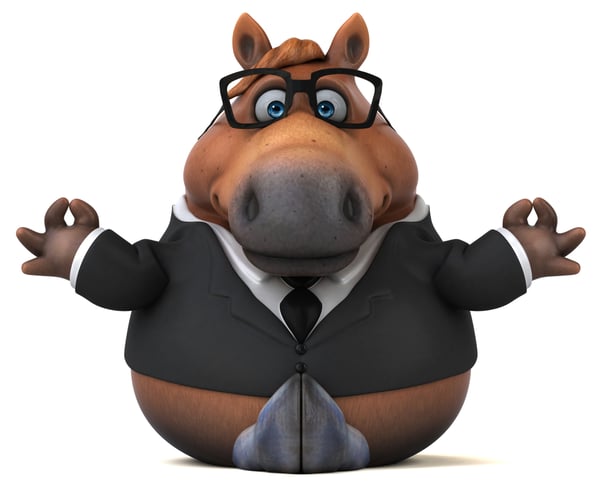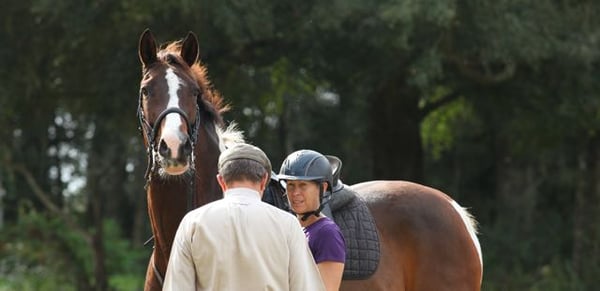In the Q&A calls we do for our online programs, we often get questions about how to handle things when you take your horse off your property and he acts completely different than he does at home (usually more excited).
When challenging and unexpected moments arise we need to be better horsemen, but we can't expect ourselves to magically become that in an instant. We can, however, up our game in our everyday moments, and we can plan opportunities to elicit challenging behavior on days we are prepared to 'go there'. We can get more experience when it’s planned and when we have the time and patience to help our horse through it. The better we have rehearsed at home, the better we will be able to make the best of it when it happens elsewhere.
Preparation will involve more thought than just taking your horse off the property a lot. How you handle your horse's challenging behavior when you are away from home will be a product of:
- How you handle similar challenges at home on a daily basis.
- Your emotional state in the moment.
Here's what to do:
- Eliminate the reasons that could make the situation worse.
- Get better at the things that will make it better.
- Put in the time at home to to practice and prepare.
The particular exercises to do when your horse is excited away from home could be quite different for different horses. I'll explain the factors that will enable the exercise you choose to actually work!
"If your horse is afraid (no matter how irrational it seems), you have to honor that and make sure you are a source of calm, clear leadership and safety. Do NOT become yet another thing for him to be afraid of."
Take Responsibility - Feel Compassion
The most common thing that makes any situation worse is us. We have to make sure we are at our best for our horses in every situation. It’s easy to get frustrated or disappointed when our horses act up, especially if it's during something we have invested a lot of time or money in, like going to a competition. Your emotional fitness matters. Don't let your horse feel your frustration or disappointment. Your stress will make them more afraid.
We have to remember that MOST of the time when our horse acts unusually excited it’s because of fear. If your horse is afraid (no matter how irrational it seems), you have to honor that and make sure you are a source of calm, clear leadership and safety. Do NOT become yet another thing for him to be afraid of.
Sometimes at a new location, your horse can be simply ‘fresh and excited’, but their big energy may intimidate or scare you. If you feel afraid it can make you either freeze or over-react. This could make the situation even more dangerous. It can take a fresh happy horse and make it afraid and tense! If you find yourself in a situation where you are afraid of your horse, don’t be shy about asking for help. Fear begets fear and you need to break the cycle.
As you practice seeing fear and tension and finding ways to alleviate it, you will get better at seeing the difference between a scared, inattentive horse and a horse who is fresh, happy, and playful. Notice this at home. If your horse is 'up' and listening to you, then you can practice trusting him and your riding skills. Maybe you are about to have the best ride ever!

A Reflex To Relax
Practice improving your emotional fitness and having a reflex to relax on a daily basis. Make sure you can take a breath and dissolve your own tension. Do your best to have a sense of humor: ‘Well that certainly didn’t turn out as planned!’
If you aren't able to notice and clear the little tensions that creep in during normal days, then you definitely won't be able to manage them in the more challenging moments. Actively practice releasing negative emotions and make a habit of getting curious. You can start by simply stating out loud: "I am really tense right now!" Then ask yourself empowering questions such as: ‘I wonder how I can help my horse?'. Remember, as frustrating as it may be to you, it is just as scary for your horse. Find a way to be compassionate towards him even as you try to get things under control. Yoga, meditation, and breath-work are all great practices to have.
Take some pressure off yourself. Don’t compound the problem by beating yourself up when things go wrong. Unexpected and challenging moments happen to everyone. All you can do is your best.
Goals and Expectations
Much of the time, tension around taking horses to shows or events is related to a lack of organization and/or too high expectations.
In the Prepare Perform Progress course (prepares riders for dressage competitions) the two over-arching themes are about setting appropriate goals and expectations, and being organized.
This is because the first and second most common reasons people have a terrible experience at a show is because they put too much pressure on themselves AND they were either running late, were distracted by logistical challenges they hadn’t prepared for, or forgot to pack necessary items. (OR all of the above!) Their poor results at the show had less to do with their skills or their horse's behavior, and more to do with their mind-set and logistics.
We know that horses pick up on our stress. Have you ever known a horse who loads perfectly EXCEPT for when you’re going to a show or important clinic? They can feel the pressure of your high expectations as soon as you set foot on the property. They see you running back and forth throwing the last minute items in the truck, perhaps stomping around, perhaps breathing heavily (or not enough), and perhaps cursing a bit every time you're near the trailer. Then you tell your horse to get on it! Yikes!
I think horses need me to write a blog for them called: What to do with my human when they freak out! :-)

Prepare Your Horse
Preparation for your horse, just like preparation for your own mental fitness, starts at home, every day. Make sure you are prioritizing communication, attentiveness, and calmness. Avoid intimidation tactics or force as a training style.
If you make a habit of fighting with your horse at home, it may ‘work out’, but in a situation where your horse’s energy is up or he is fearful it can escalate the problem quickly.
Do practice techniques for control. The goal for me is always communication but the reality is sometimes we need to be able to gain control of a situation. Control can be calm: it just needs to be effective. If you HAD to get your horse from point A to point B, could you? As much as I emphasize giving my horses freedom and choice during training as well as giving them the time they need to learn, I also know that sometimes the safety of the horse, myself, and those around me will depend on me being able to be effective. Practice this at home so you have a chance of it working when emotions are high.
Have some tried and tested strategies
Notice when your horse is inattentive, distracted, or tense at home and have some ‘go to’ exercises to bring him back to calmness.
Every horse is different, so it will be your homework (and life’s work) to figure out what those exercises are for your horse. The Habits For Excellent Horsemanship course is a good resource and there are many videos in the Video Classroom that can help with these foundational issues.
When you are diffusing a stressful situation, some horses will need to move and some will need to hang out. Some will feel better if you have close and particular conversations with them, and some will need to follow a pattern or use obstacles to bring them back to calmness.
Pay attention to what works and what doesn’t, at home. Practice different strategies on the days where he is only a little tense or distracted instead of waiting for the big blowup!
Be your horse’s rock. Be a calm leader and let him know you are the same trust-worthy person you always are. Your horse wants to feel safe and calm.
Practice
The best preparation will involve practice-runs. Take practice trips away from home on days when the only purpose is to help him feel safe and attentive. Choose the people you go with during this stage; make sure they know that your goal is to find calm attentiveness and confirm that they will be your partners in the process. Find low-stakes environments (being at a competition but not competing) and give yourself lots of time.
This way, when you do go to something that is a little more 'high stakes’, you have a better chance of predicting your horse’s behavior and can do even more to help him.
When you do all of these things, you will have set yourself up for success. As I said before, even with the best preparation, sometimes our horses need things we can't figure out, and we have one of ‘those days’…. Learn from it, do your best, and stay safe and stay calm…. Tomorrow’s another day!



